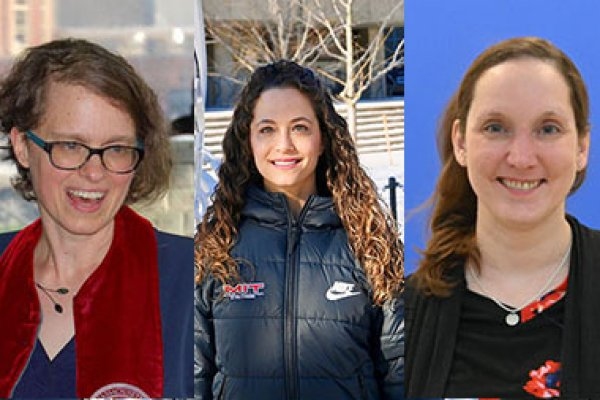
New PE.0539 course supports students who want to meet new people, strengthen friendships, build communities, and make MIT a more welcoming place.
Sarah Foote | Division of Student Life
As part of MIT Chancellor Melissa Nobles’s effort to educate the whole student, MIT’s chaplain to the Institute and associate dean Thea Keith-Lucas, along with colleagues Natalie Hill, a Methodist minister and chaplain, and Sarah Johnson, lead wellness instructor for physical education and wellness, created PE.0539 (Yoga/Emotional Intelligence, Connection, Belonging), a new course for students who are interested in forming deeper, more meaningful interpersonal connections.
While attending a conference, Keith-Lucas learned of a course being taught at the University of Southern California by Chaplain Cat Moore on rebuilding one’s social world following the heart of the Covid-19 pandemic. Keith-Lucas thought a similar course would be beneficial to MIT students and spoke with Johnson about adding a yoga component. Along with Hill, they worked with Moore to tailor her original curriculum to meet MIT students’ needs while keeping in mind periods of isolation and loneliness students may have experienced during the pandemic.
“Students learn that connecting in college can be challenging — they’re away from their families for the first time, and they may be located in a new part of the country or world, and have to make new friends without a road map to help them navigate the way. After the pandemic, students are trying to find ways to connect, belong, and feel less lonely — all topics addressed in the course,” says Keith-Lucas.
The course, known as CLICK for short, stands for “Connecting as is, Listening first, Investigating without Judgment, Communicating kindness, and Keeping in touch.” CLICK was taught for the first time at MIT in winter 2023 and focuses on emotional intelligence and social connections. During the 50-minute sessions, students work in small groups and learn valuable tips to help them navigate life — especially being on campus for the first time. Students also learn how to decompress with yoga.
CLICK also helps students examine the places they go during the week and the people they interact with, then provides “recipes” for easy conversation starters along with a blend of open-ended reflections on how to show up authentically and with compassion. Conversely, they offer advice on backing out of an unwanted conversation graciously.
Keith-Lucas says, “The course provides MIT students with the tools to rebuild their social world after Covid. They also get to practice yoga at the end of the day, which many students found to be a wonderful way to unplug after a busy day of classes, activities, and commitments.”
During each CLICK class, students use tested strategies that integrate science and experience to unpack experiences of connection, practice connecting in small groups, and create relational action plans that empower students to achieve their social and academic goals.
“The goals of the course are to provide concrete tools to help students develop and strengthen their relationships, while simultaneously teaching them yoga skills that can reduce and manage the anxiety that comes along with putting yourself out there socially, setting boundaries, and other interpersonal challenges,” says Hill. Adding, “I think that, no matter how many times we were to teach this class, each cohort would come with a brand-new set of experiences and challenges. This is definitely a class that will never be the same twice!”
Keith-Lucas adds, “The one aspect of the course I enjoyed was reclaiming our weirdness as our awesomeness, which I think is a very MIT message. Everybody feels different and awkward in their own ways. And if we recognize that, we can make more space for each other, and be more open to connecting. We can begin with just an expression of appreciation for somebody’s weirdness and awesomeness.”
“Watching the course in action was helpful. Our students can have such compassion for each other. Sometimes for our check-in, we would go around and talk about a small win for the week. I just really loved the spirit of that seeing the students make space for the ordinary challenges and triumphs of each other’s lives — to just listen well to each other and be positive,” says Keith-Lucas.
It was Johnson’s first time co-teaching with Hill and Keith-Lucas, and she found the experience working with them to be deeply rewarding.
“The course is 11 sessions and divided equally between yoga and discussion. The yoga component allows students to connect with their physical experience and set a personal intention, which provides a great starting point for engaging in the discussion. Through the discussion and physical practice, I think students learned not only from each other, but also about themselves, and seemed more comfortable starting conversations by the end of the course,” says Johnson.
Participants said they enjoyed the environment, noting that the instructors were, “fantastic, always energized, tried hard to engage the class, and made the experience super enjoyable.”
